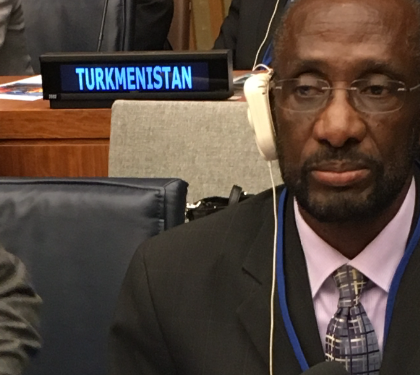The Federation of St. Kitts and Nevis is the smallest Sovereign State in the Western Hemisphere, comprising of just under 50,000 people. These 104 square miles of pristine lands are closely surrounded by the Caribbean Sea.
As such, the health of the Ocean is a daily concern for its inhabitants; not only those who rely on fishing for a daily staple or a livelihood; but significantly, as a focus for economic stimulus and growth, Nationally.
The adverse impact of climate change on the ocean, such as the rise in temperature, ocean and coastal acidification, sea-level rise, coastal erosion and extreme weather events, have not been ignored by Government nor by stakeholders in the Fisheries Industry.
In 2011, a Strategic Plan with a clearly defined Eco-system Approach to Fisheries Management (EAFM) was implemented. This plan allowed Government and all relevant stakeholders to chart a course, aimed at making Fisheries in the Federation of St. Kitts and Nevis, truly sustainable.
During the research process, which was unquestionably a fundamental aspect in devising a Strategic Plan, a number of challenges were identified. These included the need for greater communication, representation and participation among all stakeholders.
Additionally, it was determined that attention must be given to more effective disaster risk management. This was deemed critical, particularly, in light of the growing effects of climate change. These include the increasing rise in sea level, ocean surface temperature, coral bleaching events, and severe storms. We are aware of the damage to the coastal and marine environment, which is of significant concern globally.
Marine spatial planning was therefore coordinated to determine a management area comprising of zones for marine protection and other priority uses. This led to a strategic approach to better manage the Fishing Industry, utilizing the Eco-system as the guiding principle.
The Ecosystem Approach to Fisheries (EAF) resulted in a general vision for the Department of Marine Resources including short and long-term goals and capacity building: geared towards complementing the new approach.
As a result, the Fisheries sustainability thrust in the Federation of St. Kitts and Nevis is founded on three pillars; namely, Marine Management Areas, Aquaculture and Fish Aggregating Devices. This has resulted in the strengthening of the basis for implementation of the activities identified and are now closely linked to the Government’s support for climate change mitigation measures.
Marine Management Areas or MMA’s were first established in August 2016. The St. Kitts and Nevis Marine Management Area (SKNMMA) consists of a 2-mile radius around St. Kitts and Nevis and is zoned for priority uses. The intention being, to better manage the near shore Fisheries whilst reducing conflict between users.
It is our view that these types of strategies do set a standard that ensures that Fisheries sector can become more sustainable.
Additionally, the Department of Fisheries in St. Kitts and Nevis has identified five significant Management Zones namely; Conservation, Fishing Priority, Transport, Recreation and Mixed Use. MMA’s assist with climate change mitigation by promoting sustainable use of the resources, while establishing areas that focus on protecting valuable resources like nursery beds, sea grass beds and coral reefs.
Aquaculture has become one of the Federation’s most reliable fisheries sustainable measures as it involves growing marine species on a land-based controlled environment; similar to a farm. This is used for growing species such as tilapia (fish) and shrimp. The implementation of Aquaculture provides an alternative to reef fishing, thereby relieving the pressures off near shore reefs. Aquaculture also contributes to increasing food security, as species grown in this controlled environment adds to increased productivity by manipulating various factors.
Fish Aggregating Devices are manmade devices that attract migratory fish species, like Tunas and Mahi-Mahi to specific locations, deeper and further off shore than fishers ordinarily travel. This too reduces the fishing pressure on near shore reefs by providing a legal ocean based alternative allowing the use of underutilized species and ensuring long term supply of fish stocks, in pursuit of a sustainable industry.
We contend that Small Island Developing States play an integral role in driving change in the sustainability of fisheries. The Government of St. Kitts and Nevis understands its duty to its citizens, its interconnectedness to the region and to the world. As a result, the Government supports the strengthening of ocean-based economies built around sustainable activities such as Fisheries, Tourism, and Aquaculture Maritime Transportation.
It is our belief that the future of our people will be brighter if we continue our work in earnest today to protect our oceans from decline.
I thank you.











